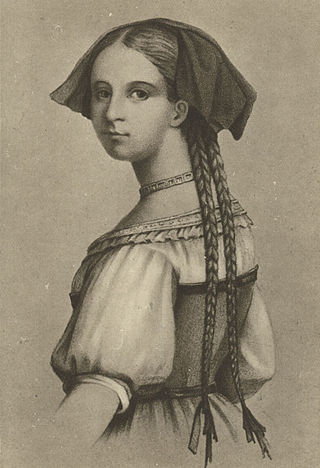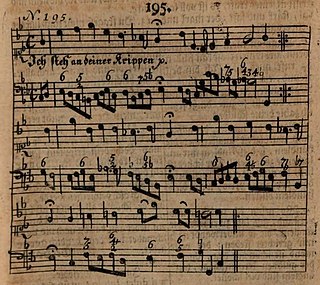Related Research Articles

Johann Ernst "Hansi" Hinterseer is an Austrian schlager singer, actor, entertainer and former alpine skier.
"O lieb, so lang du lieben kannst" is an 1829 poem by the 19th-century German writer Ferdinand Freiligrath. Hungarian composer Franz Liszt set the first four stanzas in 1843 as a lied for soprano voice and piano, S. 298, and later adapted it into the third of his Liebesträume, S. 541.

Ireen Sheer is a German-English singer. She had her first major hit in 1970 with Hey Pleasure Man. She had a top five hit on the German singles chart with "Goodbye Mama" in 1973. She went on to finish fourth at the Eurovision Song Contest 1974 representing Luxembourg, sixth at the Eurovision Song Contest 1978 representing Germany, and thirteenth at the Eurovision Song Contest 1985 representing Luxembourg again.

"Prometheus" is a poem by Johann Wolfgang von Goethe, in which the character of the mythic Prometheus addresses God in misotheist accusation and defiance. The poem was written between 1772 and 1774 and first published in 1789 after an anonymous and unauthorised publication in 1785 by Friedrich Heinrich Jacobi. It is an important work of the Sturm und Drang movement.
”Through the Long Days” is a song written by the English composer Edward Elgar in 1885 as No. 2 of his Op. 16, Three Songs. The words are from a poem by the American writer and statesman John Hay.

Michael Schanze is a German television presenter and singer.
The 66 Chorale improvisations for organ, Op. 65, were composed by Sigfrid Karg-Elert between 1906 and 1908, and first published in six volumes in 1909. The composition was dedicated to "the great organist Alexandre Guilmant".

"Welcome and Farewell" is a poem by Johann Wolfgang von Goethe from the collection Sesenheimer Lieder. It was published for the first time in 1775 in the women's magazine Iris. Franz Schubert set it to music as a lied (D.767).

"Vom Himmel hoch, da komm ich her" is a hymn text relating to the Nativity of Jesus, written by Martin Luther in 1534. The hymn is most often sung to the melody, Zahn No. 346, which first appeared in a 1539 songbook and was probably also composed by Luther. This classic Christmas carol remains popular and has inspired many choral and organ works by other composers.

"Nun freut euch, lieben Christen g'mein", or “Dear Christians, One and All, Rejoice” in English, is a Lutheran hymn, written in 1523 by Martin Luther. It is one of Luther's early hymns and considered by some as one of his finest. It was published as one of eight songs in 1524 in the first Lutheran hymnal, the Achtliederbuch. The Achtliederbuch contained four songs by Luther, three by Speratus, and one by Justus Jonas. It appeared also in 1524 in the Erfurt Enchiridion.
Spanisches Liederbuch is a collection of 44 Lieder by Hugo Wolf (1860–1903). They were composed between October 1889 and April 1890, and published in 1891. The words are translations into German by Emanuel Geibel (1815–84) and Paul Heyse (1830–1914) of Spanish and Portuguese poems and folk songs, published in a collection of 1852 also called Spanisches Liederbuch.

Der Graf von Gleichen D 918 is an unfinished 1827 opera in two acts by Franz Schubert after a libretto by Eduard Bauernfeld.

"Ännchen von Tharau" is a 17-stanza poem by the East Prussian poet Simon Dach. The namesake of the poem is Anna Neander (1615–1689), the daughter of a person from Tharau, East Prussia. The poem was written on the occasion of her marriage in 1636 and had been set to music as a song by 1642.

"Ich steh an deiner Krippen hier" is a German Christmas hymn, with lyrics by Paul Gerhardt which were first published in 1653. It was then sung with an older melody by Martin Luther, but a melody which was likely created by Johann Sebastian Bach for Schemellis Gesangbuch of 1736 is now part of current Protestant and Catholic hymnals.
"Ach, wie ist's möglich dann" also known as "Treue Liebe", and “How Can I Leave Thee” is a German now-traditional song. Friedrich Wilhelm Kücken (1810–1882), a German composer and conductor, claimed to have composed the tune, and that it was later modified "probably by Silcher" and given the general name Thüringer Volkslied. Its popularity helped Kücken get chosen for the court of Paul Frederick, Grand Duke of Mecklenburg-Schwerin. The tune is used at West Point, Lincoln University (Missouri) and Wake Forest University. Marlene Dietrich sang the song and it has been used in some movies, e.g. Three Comrades uses the melody throughout the film as Leitmotif for love. Similarly, Max Ophüls used it in the same year as a leitmotiv in Le Roman de Werther. The silent film Ach, wie ist's möglich dann (1913) by Peter Ostermayr bears the song's title.

Gerd Günther Grabowski, better known by his stage name G. G. Anderson, is a German Schlager singer, composer, and music producer.
References
- ↑ "Longfellow: 'Rondel'. (from Froissart)", allpoetry.com
- ↑ German words by Ed. Sachs